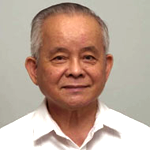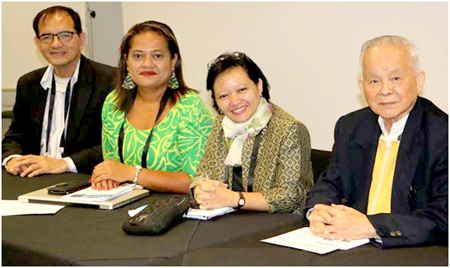Nov 8, 2016 | News
President Rodrigo R. Duterte is a communication phenomenon who needs “deconstructing” to be better understood and appreciated.
On November 25, some of the country’s top social scientists, communication scholars and practitioners will join government spokespersons in a forum aimed at dissecting the communication style that made Rodrigo R. Duterte capture the imagination of 16 million voters, receive high trust rating, and mobilize passionate defenders including the so-called “social media trolls.”
Deconstructing towards Understanding: the Communication Content & Style of President Rodrigo R. Duterte is being organized by the Asian Media Information and Communication Centre, Inc. (AMIC). It will be held at the Philippine Women’s University from 9 a.m. to 4 p.m.
According to AMIC chairman Dr. Crispin C. Maslog, deconstruction is a social science method of critical text analysis that does not actually mean “demolition.” The term was coined by French philosopher and semiotician Jacques Derrida in the 1960s. Social scientists use this as method to discover, recognize, and understand the underlying assumptions, ideas, and frames that form the basis for thoughts and beliefs.
Among the confirmed speakers are Presidential Spokesman Ernesto Abella, presidential social media expert Nicanor “Nic” Gabunada Jr., communication experts Charlie Agatep and Ramon “Bong” Osorio, sociolinguist Prof. Farah Cunanan, political scientist Dr. Clarita Carlos, historian Prof. Clement Camposano, and journalists Ellen Tordesillas, Marites Vitug, John Nery and Ging Reyes.
AMIC is a media international non-government organization (INGO) committed to promote communication and media development in the Asia Pacific region. It seeks to provide a platform for discussion of current and emerging communication issues.
During the event, AMIC will also inaugurate its new headquarters at PWU. Established and registered in 1971 as a non-profit NGO in Singapore, AMIC transferred its operation to Manila, Philippines in 2015. It is managed by the Philippine Women’s University-Asian Institute of Journalism and Communication consortium.
Those interested to attend must pre-register with Mr. Anthony G. Roman (09276996475) or Ms. Nora O. Gamolo (09323125802). You may also call AIJC at + 63 2 743-4321. Register here.

Nov 3, 2016 | News
 This November 18, 2016, the Westminster Institute for Advanced Studies and the Communication and Media Research Institute of the Westminster School of Media Arts and Design is marking the global release of Professor Cherian George’s new book Hate Spin: The Manufacture of Religious Offense and its Threat to Democracy.
This November 18, 2016, the Westminster Institute for Advanced Studies and the Communication and Media Research Institute of the Westminster School of Media Arts and Design is marking the global release of Professor Cherian George’s new book Hate Spin: The Manufacture of Religious Offense and its Threat to Democracy.
Published by the MIT Press, the book was earlier released in September 2016. Authored by Prof. Cherian George, this tome touches on religious intolerance, one of the main problems that beset many nations today.
Prof. George sees religious intolerance not as random and isolated, but part of a dangerous pattern of politics that he calls ‘hate spin’. A two-pronged weapon of identity politics, hate spin combines incitement to hatred with orchestrated outrage against perceived insults. It is not spontaneous, but manufactured by political opportunists to mobilize supporters and marginalize opponents.
He argues that hate spin requires a public response that is at least as resolute as the campaigns engineered by modern purveyors of intolerance.
Prof. George is Associate Professor in the Department of Journalism at Hong Kong Baptist University. He is editor of the Asian Journal of Communication, one of two journals published by the Asian Media Information and Communication Centre, Inc.

Sep 29, 2016 | News
 AMIC Board Chair Crispin C. Maslog has lamented the “martial law amnesia” that has affected most Filipinos today, especially the millennials.
AMIC Board Chair Crispin C. Maslog has lamented the “martial law amnesia” that has affected most Filipinos today, especially the millennials.
Maslog aired his concern in mass communication student convocations at the University of Santo Tomas September 17 and at the University of the Philippines Los Banos May 26, and over GMA’s Balitanghali news program aired Sept. 22.
During the Philippines’ martial law era from 1972 to 1981, human rights violations were rampant. The Marcos regime and its cronies plundered the Philippine economy. For these human rights violations and corruption, Marcos was ousted in 1986 by a peaceful Filipino “People Power” revolution.
Maslog warned against forgetting the past and allowing the Marcoses to return to power.
“Moving on without justice being served is not moving on – it is giving up,” reminded Maslog.
Maslog is a former journalist with Agence France-Presse, and former communication professor at Silliman University and University of the Philippines Los Baños.

Sep 28, 2016 | News
 AMIC Board Chair Crispin C. Maslog (right) and former AMIC Secretary-General Jose Ma. Carlos (left) join Vicky Lepou of Samoa (2nd from left) and Hermin Indah Wahyuni of Indonesia(2nd from right) during the World Journalism Educators Congress.
AMIC Board Chair Crispin C. Maslog (right) and former AMIC Secretary-General Jose Ma. Carlos (left) join Vicky Lepou of Samoa (2nd from left) and Hermin Indah Wahyuni of Indonesia(2nd from right) during the World Journalism Educators Congress.
AMIC Board Chair Crispin C. Maslog (right) and former AMIC Secretary-General Mr. Jose Ma. Carlos participated in the fourth World Journalism Educators Congress held in Auckland, New Zealand, on July 14-16.
Dr. Maslog was sponsored by the New Zealand Foundation, while Joe Carlos was funded by the Pacific Media Centre in Auckland, headed by Dr. David Robie, AMIC Asia Communication Awardee in 2015.
The World Journalism Education Congress (WJEC), with the theme Identity and Integrity in Journalism Education, kicked off with a formal pōwhiri ceremony hosted in the Sir Paul Reeves building at the Auckland University of Technology (AUT).
AUT students perform a Maori traditional dance to welcome the delegates.
The traditional welcome was led by AUT students and staff. The conference brought together more than 220 media and journalism educators from 42 countries around the world for three days of discussions about global media challenges and education.
Dr. Maslog and Mr. Carlos participated in the panel on Post-Cop 21 – Journalism Education in Asia-Pacific: Responding to Key Issues on Climate Change. The panel, chaired by Robie, was unanimous in saying that there is a critical need to educate journalists in the region on the problems brought about by climate change, and for the schools to start offering courses on environmental reporting. So far very little is done in this area.
Dr. Maslog also joined another panel on Global Mass Communication and Journalism Research, chaired by Dr. Alex Tan of Washington State University in the U.S. The panel was meant to provide input to a book on research being planned by Dr. Tan.
The Congress voted on Paris as the site of the next WJEC Congress three years from now in 2019.
Sep 27, 2016 | AMIC Communication Awards
AMIC has reset the deadline for submission of nominees to its 2016 Asian Communication Award to 31 October 2016.
According to AMIC Secretary General Ramon R. Tuazon, the rescheduling will ensure that more nominees can vie for this prestigious award. The 2016 winners will be announced early next year.
Since 2006, 16 individuals have been recognized by AMIC for their outstanding achievements in various media and communication fields and categories.
The AMIC Asia Communication Award 2016 will be given in the following categories:
Research—pioneering contributions to the body of knowledge on media and communication research, such as the launching and completion of major research projects or the development of enduring theoretical approaches in the discipline;
Education—legacy in nurturing successive generations of media, communication, or journalism students and scholars;
Institution building—establishment of key communication and media programs, research centres or academic publications;
Excellence in journalism—sustained involvement in public service and observance of the highest journalistic principles; and
Outstanding practitioners from a single country within Asia-Pacific, a region within Asia, or the whole of Asia-Pacific can be nominated.
While the nominee need not be from Asia-Pacific, preference is accorded to regional actors.
Past awardees include eminent communicators and journalists Dr. John Lent, 2006; Prof. Eddie C. Y. Kuo, 2007; Dr. Nora Quebral and Dr. Florangel Rosario- Braid, 2008; Dr. Binod Agrawal and Dr. K. E. Eapen, 2009; Dr. Hidetoshi Kato, 2010; Dr. Georgette Wang and Dr. Crispin Maslog, 2011; Tan Sri Dato’ L. Krishnan, 2012; Dr. Alwi Dahlan and Mr. Jakob Oetama, 2013; Mr. Juan L. Mercado, 2014; and Dr. Alan Hancock and Dr. David Robie, 2015.
The award will be presented during the 2017 AMIC international conference in Manila, Philippines.
Nomination can be made by accomplishing the official nomination form (available at www.amic.asia), and submitting it with a nomination letter to:
Ramon R. Tuazon
Secretary General
Asian Media Information and Communication Centre (AMIC)
E-mail: r.tuazon@amic.asia or rrtuazon722@yahoo.com


 This November 18, 2016, the Westminster Institute for Advanced Studies and the Communication and Media Research Institute of the Westminster School of Media Arts and Design is marking the global release of Professor Cherian George’s new book Hate Spin: The Manufacture of Religious Offense and its Threat to Democracy.
This November 18, 2016, the Westminster Institute for Advanced Studies and the Communication and Media Research Institute of the Westminster School of Media Arts and Design is marking the global release of Professor Cherian George’s new book Hate Spin: The Manufacture of Religious Offense and its Threat to Democracy.
 AMIC Board Chair Crispin C. Maslog has lamented the “martial law amnesia” that has affected most Filipinos today, especially the millennials.
AMIC Board Chair Crispin C. Maslog has lamented the “martial law amnesia” that has affected most Filipinos today, especially the millennials.
